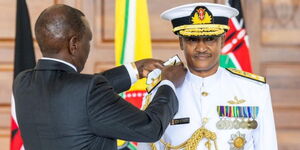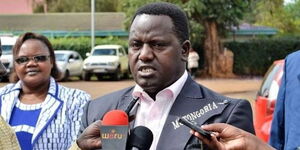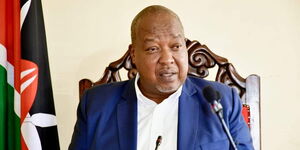The debate over maternal healthcare in the country has recently resurfaced after former President Uhuru Kenyatta claimed that the Jubilee administration's Linda Mama Programme was more effective compared to the Kenya Kwanza administration's Linda Jamii Initiative.
Although the two programmes are often confused due to their almost similar names, they differ significantly in their design and coverage of mothers and their kin.
Uhuru's Linda Mama
The Linda Mama programme was retired President Uhuru Kenyatta's administration's initiative that was previously managed by the defunct National Health Insurance Fund (NHIF), which was introduced in a bid to reduce the rate of maternal and child mortality in the country.
Introduced in October 2016, the programme was an expansion of the Free Maternity Services (FMS) programme that had been introduced in June 2013.
The programme provided free maternal health care services to expectant women, which included antenatal care, delivery, postnatal care, and three months of care for the newborn.
"The Programme covers nine months of pregnancy and three months post-delivery. All public, private, and faith-based health facilities that are duly accredited and contracted by NHIF implement the Programme," a previous report by the attorney general read.
Ruto's Linda Jamii
On the other hand, the Linda Jamii Programme was introduced by President William Ruto's administration in June 2025 and is under the Social Health Authority Insurance Programme.
Contrary to the previous programme, Linda Mama, which was now engineered to replace President Uhuru's Linda Mama Programme, covers the expectant mother, the husband, and other children.
The programme covers antenatal care, delivery, postnatal care, and essential newborn services, and also other advanced services such as Intensive Care Unit (ICU) and High Dependency Unit (HDU) services for both the mother and the infant in case of any complication.
Another notable addition to the new package is the inclusion of Anti-D serum treatment, a critical intervention for Rhesus-negative mothers to prevent complications in future pregnancies.
Under SHIF, several significant changes are:
1. Standard Delivery Costs: SHA will set a standard delivery fee of Ksh10,000 for normal deliveries. Previously, costs were pegged at Ksh5,000.
2. Caesarean Sections: Coverage for caesarean sections will be Ksh34,200, which includes a maximum hospital stay of three days. This represents a significant increase from the previous coverage of Ksh17,500.
3. Universal Access: Regardless of whether a mother opts for a public or private facility, the cost will be standardised at Ksh10,000 for normal deliveries and Ksh30,000 for higher-tier facilities.
4. Enhanced Coverage: SHA will cater to complications for both mothers and babies, including postnatal care, ICU, newborn ICU, and High Dependency Unit (HDU) services. This comprehensive coverage marks a substantial improvement over the NHIF scheme.
Uhuru's Opinion
Speaking during the Jubilee Party National Delegates Conference on Friday, September 26, former President Uhuru Kenyatta came out swinging and criticised President William Ruto's health and infrastructure projects, such as roads, warning that they may fail to yield economic benefits.
Kenyatta claimed that the Current Linda Jamii Programme was untested before being rolled out and, in turn, will increase the burden on taxpayers.
“Today, many of the gains we had in the past have been eroded. Linda Mama and others were replaced by new, untried, untested schemes. And while we wait for these experiments to work, Kenyans suffer and our progress is retarded,” the former Head of State said.
UDA's Response
In a statement on Saturday, September 27, United Democratic Secretary General Hassan Omar labelled Kenyatta's claims as not borne by facts.
"It was an attempt at throwing some wind into the sail of what is becoming abundantly clear every passing day: His administration had made peace with mediocrity and below average," Omar stated.
Additionally, Omar claimed that the current administration has made significant strides in road projects in the country compared to the Kenyatta administration. According to Omar, the Ksh1.1 trillion in roads' pending bills left by the previous administration were the key reason why there are still hundreds of stalled road projects.
It has taken the Kenya Kwanza Government to creatively find a formula without resorting to the kind of debt Jubilee left behind. We are now building roads using locally mobilised resources by security, a part of the Road Maintenance Levy Fund," Omar stated.












